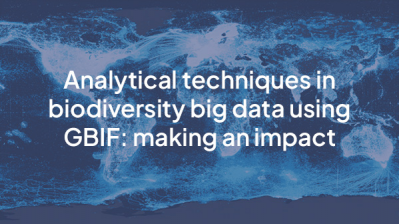Analytical techniques in biodiversity big data using GBIF: making an impact
- Parker-Allie, Fatima |
- Cezón, Katia |
- Pando, Francisco |
- Aguilar, Fernando |
- Harebottle, Doug |
- Du Plessis, Morne |
- Skowno, Andrew |
- van der Colff, Dewidine |
- Monyeki, Maphale |
- Visser, Vernon |
- eLearning, Sanbigbif |


Course Description
The vast quantities of biodiversity data put together in a uniform, FAIR way, and now available, in part led by GBIF, is recognized as an enabler of high impact innovative science, and a key to respond to the current societal challenges. However, the exploitation of this resource is often hindered by limited capacity.
SANBI-GBIF in Partnership with GBIF Spain are exploring ways of using big data analytics to enable the mining of the data, and the identification of some key tools, techniques and approaches that can be used to ask some pertinent research questions related to time, space and taxonomy.
The contents of the course will include aspects such as the GBIF API, the use of Jupyter notebooks, using big data analytic techniques to manage aspects of data quality like time, space and taxonomy, data visualisation, conservation planning and species distribution modelling using deep learning approaches.
This course will include trainers from GBIF South Africa and GBIF Spain including key experts from the University of Cantabria, with expertise in Data Science and Big Data Analytics.
Target Audience
The target audience for this course would include stakeholders from research organisations, museums, herbaria, provincial organisations, government officials dealing with biodiversity data, biodiversity information practitioners, academics, and students.
Course requirements for participants
1. Relevant bachelor’s degree in natural or earth science such as biology, botany, zoology, forestry, geography, or a related field of biodiversity informatics, or Geographic Information Systems (GIS). Participants have found some prior experience in using R is helpful for this course, although this is not a requirement.
2. Criteria for selection of participants will include:
a. Relevance of work / study to the course
b. Commitment to apply and disseminate skills
3. An effort will be made to ensure there is a racial, gender and national institutional representation among the participants
4. Must to bring a computer with at least 4 GB of RAM.
Información del curso
Programme and Course Content

Course contents
|
You can access all the content from the main page of the course by clicking on the icon shown below. |
Programme
- Session 1: Introduction - Fatima Parker-Allie
- Session 2: Concepts - Francisco Pando
- Session 3: Data Sources - Katia Cezón
- Session 4: GBIF API - Francisco Pando
- Session 5: Jupyter Notebooks - Vernon Visser
- Session 6: Data Visualisation - Katia Cezón
- Session 7: Finding Outliers / Data Reduction Techniques – Time, Space, Name - Francisco Pando
- Session 8: Molecular data mobilization - eDNA - Morne Du Plessis
- Session 9: Image Segmentation – Deep Learning using EO browser/ Sentinel playground - Fernando Aguilar
- Session 10: Distribution models using Maxent and Machine Learning Techniques - Francisco Pando
- Session 11: National Biodiversity Assessment: Species & Ecosystem Assessment - Andrew Skowno & Maphale Monyeki
- Session 12: Conservation planning - Douglas Harebottle
- Session 13: Conversation on search engines-ChatGPT - Francisco Pando
- Session 14: Course Evaluation Wrap-Up and Closing - Fatima Parker-Allie
Content Download
|
The complete course is available for download from the "Content Download" section on the course homepage. This content package is presented as a zip file named "Course-Name.zip" and allows you to replicate the entire course structure and content. To open this SCORM package on your computer, follow these instructions:
Please note that some of the provided content (presentations or documents) is only available with an internet connection.
|

Tutores

Parker-Allie, Fatima

Cezón, Katia

Pando, Francisco
Aguilar, Fernando
Harebottle, Doug
Du Plessis, Morne
Skowno, Andrew
van der Colff, Dewidine
Monyeki, Maphale
Visser, Vernon

eLearning, Sanbigbif

